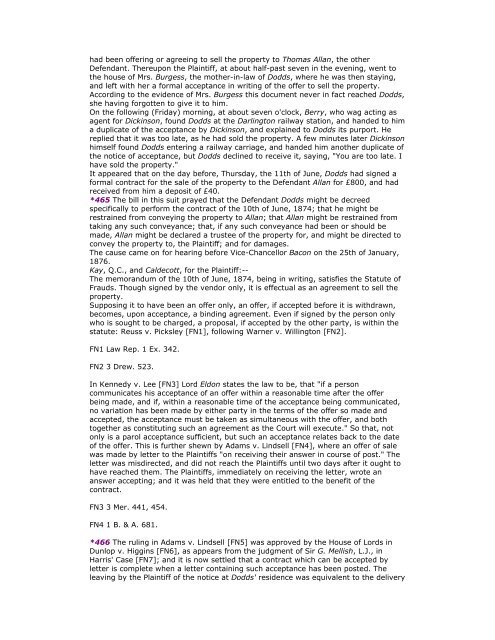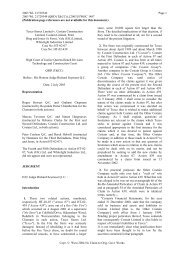Dickinson v Dodds - Thomson Reuters
Dickinson v Dodds - Thomson Reuters
Dickinson v Dodds - Thomson Reuters
You also want an ePaper? Increase the reach of your titles
YUMPU automatically turns print PDFs into web optimized ePapers that Google loves.
had been offering or agreeing to sell the property to Thomas Allan, the otherDefendant. Thereupon the Plaintiff, at about half-past seven in the evening, went tothe house of Mrs. Burgess, the mother-in-law of <strong>Dodds</strong>, where he was then staying,and left with her a formal acceptance in writing of the offer to sell the property.According to the evidence of Mrs. Burgess this document never in fact reached <strong>Dodds</strong>,she having forgotten to give it to him.On the following (Friday) morning, at about seven o'clock, Berry, who wag acting asagent for <strong>Dickinson</strong>, found <strong>Dodds</strong> at the Darlington railway station, and handed to hima duplicate of the acceptance by <strong>Dickinson</strong>, and explained to <strong>Dodds</strong> its purport. Hereplied that it was too late, as he had sold the property. A few minutes later <strong>Dickinson</strong>himself found <strong>Dodds</strong> entering a railway carriage, and handed him another duplicate ofthe notice of acceptance, but <strong>Dodds</strong> declined to receive it, saying, "You are too late. Ihave sold the property."It appeared that on the day before, Thursday, the 11th of June, <strong>Dodds</strong> had signed aformal contract for the sale of the property to the Defendant Allan for £800, and hadreceived from him a deposit of £40.*465 The bill in this suit prayed that the Defendant <strong>Dodds</strong> might be decreedspecifically to perform the contract of the 10th of June, 1874; that he might berestrained from conveying the property to Allan; that Allan might be restrained fromtaking any such conveyance; that, if any such conveyance had been or should bemade, Allan might be declared a trustee of the property for, and might be directed toconvey the property to, the Plaintiff; and for damages.The cause came on for hearing before Vice-Chancellor Bacon on the 25th of January,1876.Kay, Q.C., and Caldecott, for the Plaintiff:--The memorandum of the 10th of June, 1874, being in writing, satisfies the Statute ofFrauds. Though signed by the vendor only, it is effectual as an agreement to sell theproperty.Supposing it to have been an offer only, an offer, if accepted before it is withdrawn,becomes, upon acceptance, a binding agreement. Even if signed by the person onlywho is sought to be charged, a proposal, if accepted by the other party, is within thestatute: Reuss v. Picksley [FN1], following Warner v. Willington [FN2].FN1 Law Rep. 1 Ex. 342.FN2 3 Drew. 523.In Kennedy v. Lee [FN3] Lord Eldon states the law to be, that "if a personcommunicates his acceptance of an offer within a reasonable time after the offerbeing made, and if, within a reasonable time of the acceptance being communicated,no variation has been made by either party in the terms of the offer so made andaccepted, the acceptance must be taken as simultaneous with the offer, and bothtogether as constituting such an agreement as the Court will execute." So that, notonly is a parol acceptance sufficient, but such an acceptance relates back to the dateof the offer. This is further shewn by Adams v. Lindsell [FN4], where an offer of salewas made by letter to the Plaintiffs "on receiving their answer in course of post." Theletter was misdirected, and did not reach the Plaintiffs until two days after it ought tohave reached them. The Plaintiffs, immediately on receiving the letter, wrote ananswer accepting; and it was held that they were entitled to the benefit of thecontract.FN3 3 Mer. 441, 454.FN4 1 B. & A. 681.*466 The ruling in Adams v. Lindsell [FN5] was approved by the House of Lords inDunlop v. Higgins [FN6], as appears from the judgment of Sir G. Mellish, L.J., inHarris' Case [FN7]; and it is now settled that a contract which can be accepted byletter is complete when a letter containing such acceptance has been posted. Theleaving by the Plaintiff of the notice at <strong>Dodds</strong>' residence was equivalent to the delivery
















